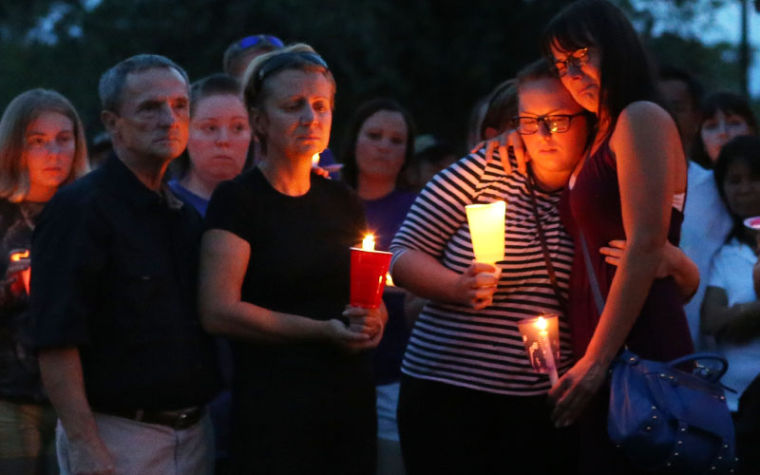
INDIAN RIVER COUNTY — A string of recent homicides has undeniably shaken residents of Indian River County and surrounding communities. On Friday evening, approximately 200 people congregated at Riverside Park in Vero Beach to remember four victims whose lives were stolen early.
A crowd of supporters holding lit candles and wearing purple, the color symbolizing a stance against domestic violence, stood in silence around grieving family members and friends of the deceased.
Diana Duve and Bridget Feacher, of Indian River County, Grace Ann Assenza, of St. Lucie County, and Jessica Lashay Exantus, of West Palm Beach, were each found dead within a few days of each other.
Though the timing seems to be coincidental as no two murders have been linked together, they all have one common thread – the prime suspect in each case was romantically involved with the woman they are accused of killing.
As a result, Friday night’s candlelight vigil delivered one strong message: stop domestic violence.
“One in three women will be a victim of domestic violence at some point in their lives,” said Tracy Levy, director of development at SafeSpace. “Five hundred eighty-two cases of domestic violence were reported last year in Indian River County, and if you consider all the cases that go unreported, you’re talking very scary numbers.”
SafeSpace is an organization dedicated to helping victims of domestic violence escape their abusers by offering safe shelters, programs, and services to anyone needing to flee a dangerous situation.
“The most dangerous time for a victim is when she leaves [her abuser]” Levy said.
According to SafeSpace CEO Jill Borowicz, without the assistance of family or an experienced organization like SafeSpace, a woman is 75 percent more likely to lose her life at the hand of her abuser once she leaves him behind.
The statistics, according to SafeSpace, do not support the common notion that a woman should simply walk away from an abusive relationship and never look back.
“These women were murdered because these men chose to murder them,” Borowicz said. “We have to talk about [domestic violence] in different ways. We have to make victims feel safe, not like they are being blamed.”
Blame, Borowicz said, can come in a number of different forms. Blame for beginning a relationship, blame for continuing a relationship too long, blame for drug or substance abuse, blame for life choices, the list continues.
“We can’t blame the victim and then expect them to feel safe coming forward,” Borowicz said.
Bill Andrews, the step-father of Vero Beach victim Diana Duve, addressed the crowd toward the end of the vigil. He urged people to look out for one another, to keep an eye out for signs of domestic abuse, and to be active about reporting concerns.
“We never knew,” Andrews said about his daughter’s apparent abusive relationship. “If we had known, this would have never happened.”
Brittany Norair, one of the organizers of the vigil, stressed the importance of raising awareness around the pervasive issue.
“We need to raise awareness about [domestic violence] so it doesn’t happen to another one of our friends, daughters, or sisters,” Norair said.
Though awareness and community support are a starting point to tackle such a large-scale problem, those from SafeSpace say there is a need for a broad social change, a general change in attitude, and repairs that need to be made to a broken judicial system.
But for now, in the wake of such losses, much of the community is focused on healing and moving forward after losing a daughter, a friend, a colleague, a mother, and a part of their lives that can never be replaced.



